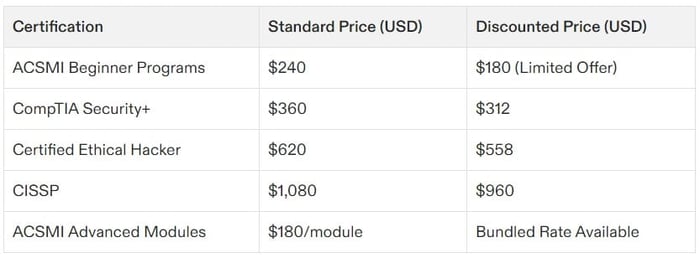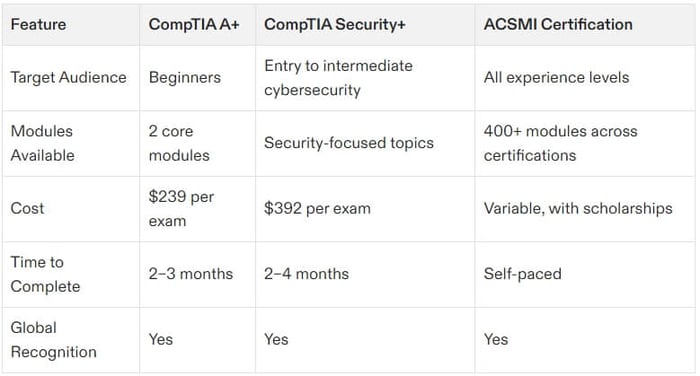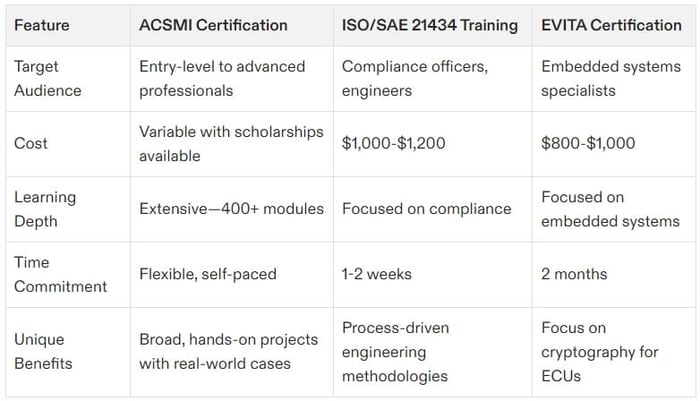Table of Contents
- Understanding the Cybersecurity Certification Exam Cost
- Factors Influencing Cybersecurity Certification Exam Cost
- Tips for Managing Cybersecurity Certification Exam Cost
- Popular Cybersecurity Certifications and Their Exam Costs
- FAQs About Cybersecurity Certification Exam Cost
- Certification Costs
- Final Thoughts
Advancing your career in cybersecurity often requires earning certifications that validate your skills and expertise. However, the cybersecurity certification exam cost is one of the most significant considerations for professionals entering or progressing in the field. From entry-level certifications to advanced credentials like CISSP, understanding the cost implications can help you plan your career path more effectively.
This guide dives deep into the cybersecurity certification exam cost, breaking down pricing details, influencing factors, and ways to save on certification expenses. We’ll also introduce flexible learning platforms like ACSMI to help you stay on track while managing costs.
Understanding the Cybersecurity Certification Exam Cost
The cybersecurity certification exam cost refers to the fee you pay to take the examination required for earning a certification. This fee is usually set by the organization offering the credential, such as CompTIA, (ISC)², or EC-Council.
Exam costs can range widely depending on the certification level, provider, and exam complexity. For instance, entry-level certifications like CompTIA Security+ are generally less expensive, costing around $360, while advanced certifications like Certified Information Systems Security Professional (CISSP) can run up to $1,000 or more.
Here is a quick breakdown of typical exam costs across different levels:
- Entry-Level Certifications: $200–$400
- Mid-Level Certifications: $400–$800
- Advanced Certifications: $800–$1,200+
Understanding these costs is essential for budgeting effectively and prioritizing certifications that align with your career ambitions.
Factors Influencing Cybersecurity Certification Exam Cost
Several factors contribute to the variation in certification exam costs. Knowing these aspects can help you make informed financial decisions.
1. Certification Difficulty Level
The complexity of the exam directly impacts costs. Certifications aimed at advanced professionals with deeper technical skills typically demand higher fees. For example, CISSP and Certified Ethical Hacker (CEH) exams are more costly than foundational ones like CompTIA Security+.
2. Reputation of Certification Body
Organizations with global recognition and credibility, such as (ISC)² and EC-Council, tend to charge higher fees for their certifications due to the value they hold in the job market.
3. Regional Pricing
Exam costs can differ based on your geographical location. Certain certification providers offer discounted rates for developing regions to ensure accessibility.
4. Training and Preparation Materials
Some certifications bundle exam fees with preparation materials, practice tests, or access to online labs. While this increases the overall cost, it often provides a comprehensive learning experience.
5. Certification Validity
Renewable certifications requiring periodic re-certification may feature lower initial fees but additional costs for renewals or Continuing Professional Education (CPE) credits.
6. Discounts and Promotions
Look out for promotions, discounts, or group packages. Platforms like ACSMI often provide competitive deals and savings opportunities for aspiring candidates.
Tips for Managing Cybersecurity Certification Exam Cost
Budgeting for certifications doesn’t need to drain your resources. Here are some tips to manage costs effectively while achieving your career goals.
1. Plan Your Career Path
Spend time mapping out your career goals and identifying which certifications align best. For example, if you’re focused on ethical hacking, prioritize certifications like CEH or PenTest+. This will prevent unnecessary spending on unrelated certifications.
2. Use Study Bundles
Many certification bodies and platforms bundle exams with study guides, practice tests, and training modules. Purchasing these packages can often lower your overall spending. For example, flexible learning platforms like ACSMI allow you to access 400+ modules tailored to specific certifications.
3. Look for Discounts
Maximize savings by utilizing discounts provided during events like Cybersecurity Awareness Month, Black Friday, or regional promotions. Organizations such as (ISC)² and CompTIA often announce temporary discounts during these periods.
4. Employer Sponsorship
Many employers support upskilling by reimbursing fees for cybersecurity certifications. Check with your current or potential employer about funding opportunities for professional development.
5. Choose Flexible Payment Options
Some platforms, including ACSMI, offer installment plans or financing options. This makes high-cost certifications more manageable by spreading payments over time.
Popular Cybersecurity Certifications and Their Exam Costs
When considering the cybersecurity certification exam cost, it’s essential to understand the variety of certifications available and what they offer. Below, we’ve outlined some of the most popular certifications, their associated exam fees, and what makes each certification unique.
CompTIA Security+
CompTIA Security+ is one of the most well-recognized entry-level certifications in cybersecurity. Designed for professionals who are beginning their careers, it covers foundational topics such as network security, risk management, and threat assessments. The cost of the Security+ exam is approximately $360. This certification is ideal for those taking their first step into IT security, as it lays a solid groundwork for more advanced certifications in the future.
Certified Ethical Hacker (CEH)
The Certified Ethical Hacker (CEH) certification is a mid-level credential that’s perfect for professionals focusing on penetration testing and vulnerability detection. CEH equips candidates with the knowledge to think and act like a hacker, allowing them to identify and mitigate security threats effectively. The exam cost for CEH is around $620, making it a significant investment for individuals pursuing ethical hacking roles.
Certified Information Systems Security Professional (CISSP)
The CISSP certification is a prestigious and globally recognized credential for experienced cybersecurity professionals. It is an advanced certification that encompasses eight domains, including security architecture, risk management, and cryptography. The exam fee for CISSP typically ranges between $749 and $999 depending on your region. This certification is best suited for senior professionals aiming for leadership roles in IT security and is widely regarded as an industry gold standard.
CCSP (Certified Cloud Security Professional)
Focusing on cloud security, the CCSP certification is designed for IT and cybersecurity professionals who specialize in securing cloud environments. This certification is particularly valuable for cloud engineers and security analysts. The cost of the CCSP exam is $599, reflecting its comprehensive coverage of subjects such as data protection, identity management, and compliance in cloud infrastructure.
Modular ACSMI Certifications
For a flexible, customizable learning path, ACSMI offers modular certifications tailored to specific needs. Each module costs $180, and with over 400 available, learners can focus on areas relevant to their career goals. From foundational cybersecurity concepts to advanced, industry-focused training, ACSMI’s approach allows professionals to curate their certification experience. Additionally, bundle rates and promotions frequently reduce these costs, making them an attractive option for learners seeking affordability and quality.
Each of these certifications caters to a specific stage in a cybersecurity career, from entry-level professionals gaining exposure to seasoned experts advancing into niche areas. By understanding the value and focus of each certification alongside its cost, you can better plan your career trajectory and investments.
FAQs About Cybersecurity Certification Exam Cost
1. Can beginners afford cybersecurity certification exams?
Yes. Many beginner-level certifications, such as CompTIA Security+ and modular ACSMI programs, are priced affordably to ensure accessibility for professionals just starting.
2. Are discounts available for certification exams?
Yes! Many certification providers like ACSMI offer frequent discounts during special occasions or promotional events. Check their deals here.
3. Why are advanced certification exams more expensive?
Advanced certifications cover in-depth knowledge and skills, requiring rigorous preparation. The higher costs reflect their prestige and the expertise level they validate.
4. Do certification prices include training materials?
Not always. Some providers, like ACSMI, bundle training and exam fees together, while others charge separately for preparation materials.
5. Can I retake the exam without repaying the full fee?
It depends on the provider. Some certifications charge a discounted retake fee, while others require full repayment.
Certification Costs
With ACSMI’s modular approach, you can choose affordable options to structure your learning path efficiently, from beginner to advanced certifications. Explore affordable modules here.
Final Thoughts
Navigating the costs of cybersecurity certification exams is a critical part of career planning. By understanding the cybersecurity certification exam cost, you can make informed decisions around budgeting, timelines, and certification paths.
From entry-level credentials like CompTIA Security+ to esteemed certifications like CISSP, each investment pays dividends in terms of career growth and earning potential. Platforms like ACSMI simplify this process by offering affordable, accessible solutions with 400+ tailored modules.
Whether you're advancing your expertise or just starting your cybersecurity career, smart planning and awareness of cost-effective options will help you succeed.





